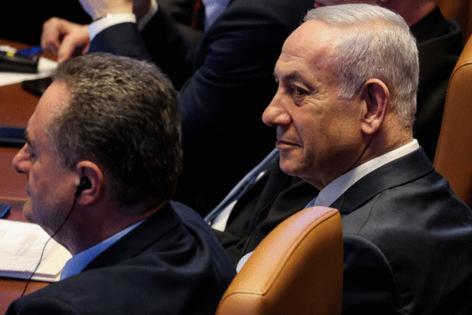Israel attacks Iran's nuclear program in major escalation
Published in News & Features
Israel launched waves of airstrikes against Iran’s nuclear program and ballistic-missile sites on Friday morning, a major escalation in the standoff between the two adversaries that risks sparking a wider war in the Middle East.
Explosions were heard across Tehran and in the city of Natanz, home to one of its nuclear sites, according to videos and local media. Prime Minister Benjamin Netanyahu said Israel had “struck at the heart of Iran’s nuclear enrichment program” as well as leading nuclear scientists and the ballistic missile program.
Netanyahu said the operation “will continue for as many days as it takes to remove this threat.”
Oil surged and U.S. equity futures dropped.
Israel also targeted some of Iran’s nuclear scientists and generals. Iranian state television reported that the head of the Islamic Revolutionary Guard Corps, Maj. Gen. Hossein Salami, was killed.
Netanyahu’s government ordered the strikes in apparent defiance of U.S. President Donald Trump, who had said earlier Thursday he didn’t want Israel to attack and his administration remained “committed to a Diplomatic Resolution to the Iran Nuclear Issue!” Trump had also suggested he didn’t think an attack was imminent.
The U.S .was “not involved” in Israel’s strikes, Secretary of State Marco Rubio said. Rubio warned Iran against targeting U.S. interests or personnel in retaliation. A team of American negotiators was set to head to Oman on Sunday for another round of talks with Iranian officials to impose limits on the country’s nuclear program.
Israel is already bracing for a retaliatory strike from Iran, an exchange that risks plunging the region even deeper into crisis and hitting the global economy.
Stocks fell along with equity-index futures and investors rushed to the safety of havens such as Treasuries. Crude oil jumped as much as 9%, with Brent up to around $74.65 a barrel as of 9:55 a.m. in Singapore, while gold also rose.
“Israel’s alarming decision to launch airstrikes on Iran is a reckless escalation that risks igniting regional violence,” Sen. Jack Reed, the top Democrat on the Senate Armed Services Committee, said in a statement. He said Trump and other nations need to push for “diplomatic deescalation before this crisis spirals further out of control.”
Israeli Defense Minister Israel Katz said he’s declaring a state of emergency because of Israel’s “preemptive strike against Iran,” which he said involved drones and missiles.
Tehran has repeatedly insisted that its atomic activities are for peaceful, civilian purposes only. But it has significantly expanded uranium enrichment since 2019 and in response to Trump’s withdrawal a year before from a 2015 nuclear deal signed under Barack Obama’s administration.
Efforts by Trump to forge a new deal since he returned to power in January made stuttering progress. The two sides were unable to bridge their main dispute: the U.S. and Israel argue that Iran must not be allowed to enrich uranium, while Tehran had said it must retain that right. The Islamic Republic says it needs to process uranium, at least to a low level, for civilian purposes such as fueling nuclear power plants.
Iran had ratcheted up tensions on Thursday, when officials announced they would inaugurate a new uranium-enrichment facility. That was after the International Atomic Energy Agency — the United Nations’ atomic watchdog — said Iran wasn’t complying with its international obligations. The IAEA’s move set up a potential referral to the U.N. Security Council for a renewal of widespread sanctions.
“The U.S. has been trying to negotiate, but it’s not going anywhere,” Matt Kroenig, senior director of the Scowcroft Center for Strategy and Security at the Atlantic Council, said in an interview. “There was no deal to be had.”
Israel closed its airspace until further notice, while Iran halted operations at its main airport in Tehran. The two states, along with neighboring countries including Iraq, have restricted and re-opened their airspaces several times since Oct. 7, 2023, when a Hamas attack on Israel sparked a wider regional conflict.
The initial closures happened when Tehran launched a missile strike at Tel Aviv in April last year and resulted in neighboring nations also detouring flights for hours.
Israel is already involved in a major military operation in Gaza where it’s been bombarding and blockading the population for the past 20 months as it tries to destroy Hamas. The Palestinian group is designated a terrorist organization by the U.S. and European Union.
Iran and Israel have been locked in a shadow war for decades with Tehran — which doesn’t recognize the state of Israel — using proxy forces such as Hezbollah in Lebanon, Hamas in Gaza and the Houthis in Yemen to attack the Jewish state.
Israel has in turn been accused of being behind a series of assassinations and covert attacks on Iranian soil, many of them targeting nuclear scientists.
(Nick Wadhams, Jon Herskovitz and Ramsey Al-Rikabi contributed to this report.)
©2025 Bloomberg L.P. Visit bloomberg.com. Distributed by Tribune Content Agency, LLC.







Comments